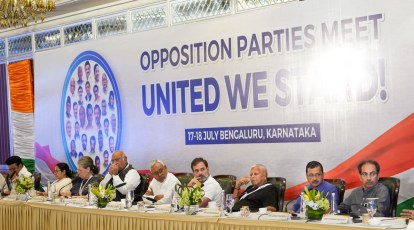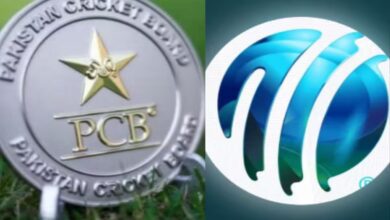Congress Denies Interest in PM Post: Opposition Parties Convene in Bengaluru
Congress president Mallikarjun Kharge and leaders from various opposition parties have gathered in Bengaluru for a two-day meeting to discuss the formation of a united front to challenge the BJP in the upcoming elections. This article highlights the key points from the meeting, including Congress's stance on power and the Prime Minister's post, the potential name of the opposition front, and the participation of prominent leaders.

Congress Denies Interest in PM Post: Opposition Parties Convene in Bengaluru
Congress president Mallikarjun Kharge clarified that his party is not driven by a quest for power or the Prime Minister’s post. Taking a swipe at the BJP, he criticized their attempts to mend relationships with former allies, stating that the BJP secured its majority by utilizing the votes of its allies and later abandoning them. Kharge emphasized that the Congress-led opposition comprises 26 parties, 11 of which are in government in various states.

Name and Composition of Opposition Front: Sources suggest that the opposition front could be named I-N-D-I-A (Indian National Democratic Inclusive Alliance). However, the Left parties have expressed their reservations about the word “alliance” and have called for its reconsideration. Sonia Gandhi, the former chairperson of UPA, is likely to be named President of the Front, with Nitish Kumar potentially serving as the Convenor.
Prominent Leaders in Attendance: The gathering in Bengaluru includes Congress president Mallikarjun Kharge, Rahul Gandhi, Chief Ministers MK Stalin, Nitish Kumar, Arvind Kejriwal, Hemant Soren, Mamata Banerjee, and RJD chief Lalu Prasad, among others. Sharad Pawar, whose party recently witnessed a split, also joined the meeting.
Nomenclature and Common Minimum Programme: All parties have been requested to suggest a name for the front, with the condition that it should include the word “India.” The tagline “United we stand” has been proposed. Suggestions are also being sought for the Common Minimum Programme, which outlines the shared agenda of the opposition. The discussion emphasized keeping state issues separate.
Reconciliation and Collaboration: The dinner meeting held at the Taj West End Hotel witnessed Mamata Banerjee and Sonia Gandhi seated together, indicating a mending of relations between the Congress and Trinamool Congress. Both parties acknowledge the need to prioritize defeating the BJP to safeguard democracy and federalism.

The Congress BJP History
The history of relations between the Bharatiya Janata Party (BJP) and the Indian National Congress, commonly known as Congress, is a significant chapter in Indian politics. These two major political parties have played a central role in shaping the political landscape of the country, and their interactions have been marked by rivalry, competition, and occasional collaboration.
The BJP came into existence in 1980 through the merger of various right-wing political parties, primarily the Bharatiya Jana Sangh (BJS). In contrast, the Congress has a much longer history, tracing its roots back to the Indian National Congress founded in 1885 during the British colonial era. With its deep roots and established presence, Congress initially held a dominant position in Indian politics.
For many years, the BJP struggled to establish itself as a strong national political force due to Congress’ stronghold. However, a significant turning point came in the late 1980s with the emergence of the Ram Janmabhoomi movement. This movement sought to construct a temple dedicated to Lord Ram at the site of the Babri Masjid in Ayodhya, Uttar Pradesh. The BJP, along with various Hindu nationalist groups, actively supported the cause, and this movement helped the party gain widespread visibility and support.
The political landscape of India witnessed a dramatic shift in the 1990s. The BJP’s rise to power was marked by the formation of a coalition government under the leadership of Atal Bihari Vajpayee in 1998. However, despite the BJP’s growing influence, Congress remained a formidable opponent, particularly in several states across the country.
The BJP and Congress have engaged in intense electoral battles over the years. Their political rivalry has often been characterized by ideological differences, regional interests, and contrasting policy approaches. Both parties have developed their own loyal voter bases and pursued distinct agendas.
At times, the BJP and Congress have also found common ground and collaborated for the greater good. Coalitions and alliances have been formed when necessary to secure power at the state or national level. These alliances have showcased the dynamic nature of Indian politics and the pragmatic approach taken by both parties.
In recent years, the BJP has experienced significant success, winning a decisive mandate in the 2014 and 2019 general elections. This has positioned the party as the dominant force in Indian politics, while Congress has faced electoral setbacks and struggled to regain its former strength.
The history of BJP and Congress relations is a reflection of the evolving political landscape in India. It highlights the interplay of power dynamics, ideological clashes, and the quest for political supremacy. The ongoing competition between these two parties continues to shape Indian politics, ensuring a vibrant democracy with diverse perspectives and voices.
Conclusion: The opposition parties’ meeting in Bengaluru signifies their determination to form a united front against the BJP in the upcoming elections. The Congress, under Mallikarjun Kharge’s leadership, has maintained a cooperative approach, expressing openness to the ideas of other leaders. The Congress’s recent victory in Karnataka has bolstered the opposition’s morale and enhanced the party’s role within the alliance. The meeting serves as a platform for discussions on key issues, with further meetings and deliberations planned to strengthen the opposition’s unity and prepare for the electoral battle ahead




